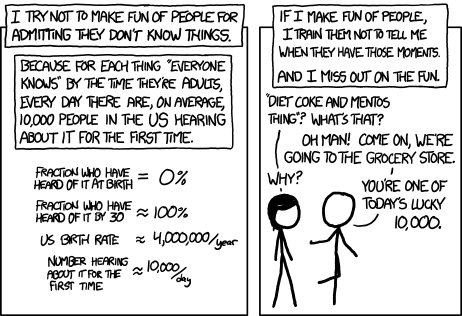So there I was, in a meeting to decide whether or not I deserved another year in the program for my PhD, and I was failing. Why, then, wasn't I kicked out of the program? That may be a question that only my committee can answer, but I'll take a stab at it. I wasn't kicked out because it's okay to be wrong. It's okay to have misunderstandings, to not know something even if almost everyone else does. What's not okay is refusing to admit that you're wrong.

Opponents of many scientific disciplines will often often point to errors scientists have made in the past as a reason not to believe what they say. After all, aren't scientists just going to change their mind again? Why should I believe what they are saying right now? The fact that science is ever changing should never be seen as a weakness. In fact, it's one of the greatest strengths that science has. Science helps us see where our understanding of the universe is wrong and correct accordingly.3
More importantly than being okay, being wrong is expected. Let's face it, you don't know everything. Admitting you don't know something is probably one of the most important aspects of science. It's only when you admit you don't know that you can actually learn. Just as there is an edge to current human knowledge, there is an edge to your own personal knowledge. If you're afraid of being stupid, then what you're actually afraid of is expanding your own knowledge. Likewise, if you mock someone else's stupidity, you're really just mocking their attempts to learn. The universe is awesome, why not take the time to tell someone about it?
And, as usual, Randall Munroe (XKCD) can say it better than I can, and in fewer words:
Notes
[1] There are other reasons to ask these questions, of course, but sometimes you can see a little smile on a committee member's face when they know they've found your educational weak spot.
[2] Since some of my committee members may actually read this, it's probably unwise to admit that. They'll probably use it to their advantage at our next meeting.
[3] There seems to be two different definitions of "truth" used in science and religion. Religion usually begins with a statement of absolute truth and builds a world view around that truth. Science on the other hand makes observations and builds a truth to match those observations. This truth is never purported to be absolute truth. The big difference is that "truth" in the scientific sense is allowed (and required) to change while "truth" from a religious viewpoint is used as a logical premise and, therefore, cannot be changed.

